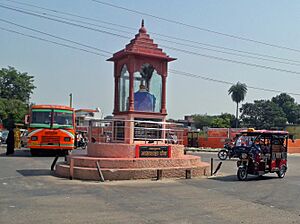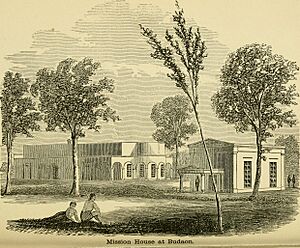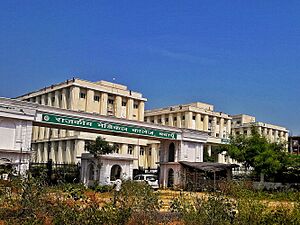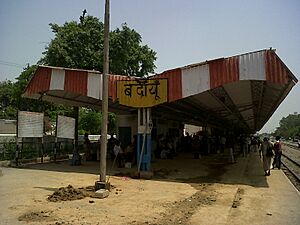Budaun facts for kids
Quick facts for kids
Budaun
|
|
|---|---|
|
City
|
|

Bhamashah Chowk, Budaun
|
|
| Country | |
| State | Uttar Pradesh |
| Region | Rohilkhand |
| Division | Bareilly |
| District | Budaun |
| Settled | 905AD (Modern City), 220BC (Ancient City) |
| Named for | Prince Budh |
| Government | |
| • Body | Budaun Municipal Council |
| Area | |
| • Total | 81 km2 (31 sq mi) |
| Elevation | 164 m (538 ft) |
| Population
(2011)
|
|
| • Total | 159,221 |
| • Rank | 17 |
| • Density | 5,489/km2 (14,220/sq mi) |
| Demonym(s) | Badayuni |
| Languages | |
| • Official | Hindi, Urdu, English |
| Time zone | UTC+5:30 (IST) |
| PIN |
243601
|
| Telephone code | 05832 |
| ISO 3166 code | IN-UP-BD |
| Vehicle registration | UP-24 |
| Climate | HS-TH (Köppen) |
| Sex ratio | 907 female/1000 male |
| Literacy | 73.00% |
| Civic agency | Budaun Development Authority |
| Governing body | Government of UP Government of India |
| Precipitation | 843 millimetres (33.2 in) |
| Avg. annual temperature | 27.5 °C (81.5 °F) |
| Avg. summer temperature | 39.8 °C (103.6 °F) |
| Avg. winter temperature | 11.5 °C (52.7 °F) |
| Also known as 'City of Saints' or 'Madinat ul Awliya', famous for its Pedas, 'Mentha City' of India. | |
Budaun (pronounced bədaːjuː) is an old city in the Uttar Pradesh state of India. It is the main city of the Budaun district. You can find it about 1.6 kilometers east of the Sot River and 27 kilometers north of the Ganges river. It's part of the Rohilkhand region of Uttar Pradesh.
Budaun became very important in history. It was the capital of the Delhi Sultanate for four years, from 1210 CE to 1214 CE. This happened during the rule of Sultan Iltutmish. Later, it was a key place on the northern border during the Mughal Empire. Today, Budaun is known as a big market and a city with rich history and religious importance. It is also called the 'City of Saints' or 'Madinat ul Awliya'.
Contents
Where Did the Name Budaun Come From?
Some experts believe the city was called Bedamooth a long time ago. This name was found on old stone writings at the State Museum Lucknow. Later, the area was known as Panchala.
A Muslim historian, Roz Khan Lodhi, said that Ashoka The Great built a Buddhist temple and a fort here. He named it BuddhMau, which means Budaun Fort. Another idea, from George Smith, is that Budaun was named after an Ahir prince called Budh.
Recent Discoveries
Even though Budaun is a very old city with lots of history, it hasn't been studied much by archaeologists. Recently, in a village called Kheda Jalalpur near Budaun, pieces of old Hindu temple statues and ancient bricks were found. Experts from the Archaeological Survey of India (ASI) believe these remains are from the time after the Gupta Period, around the 7th or 8th century.
A Look Back in Time
Local stories say that Budaun was founded in 905 A.D. by an Ahir prince named Budh. The city was then named after him. Old ruins and coins found nearby suggest that an Ahir family ruled this area a long time ago.
An old writing, probably from the 12th century, lists twelve Rathore kings who ruled Budaun. At that time, the city was called Vodamāyuta. These rulers stayed until Qutb-ud-din Aibak took over.
The first clear historical event for Budaun was its capture by Qutb-ud-din Aibak in 1196. After this, it became a very important place on the northern edge of the Delhi empire. In 1223, a large mosque with a dome was built here. In the 13th century, two of Budaun's governors, Shams-ud-din Iltutmish and his son Rukn ud din Firuz, later became emperors.
In 1571, the town was burned. About a hundred years later, during the time of Shah Jahan, the main government office moved to Sahaspur-Bilari. In 1801, Budaun and its district were given to the British government by the Nawab of Oudh.
By 1911, Budaun was a town and district in British India. An American Methodist mission ran several schools for girls and a high school for boys there.
People and Population
| Religions in Budaun City (2011) | ||||
|---|---|---|---|---|
| Religion | Percent | |||
| Hinduism | 55.15% | |||
| Islam | 43.94% | |||
| Christianity | 0.62% | |||
| Sikhism | 0.21% | |||
| Others† | 0.08% | |||
| Distribution of religions | ||||
According to the 2011 census, Budaun City had a population of 159,221 people. There were 83,475 males and 75,746 females. This means for every 1000 males, there were 907 females. About 12.3% of the people were children aged 0–6.
The adult literacy rate, which is the percentage of adults who can read and write, was 73%. The main languages spoken in the city are Hindi and Awadhi. The city covers an area of 81 square kilometers. The larger Budaun Metro Area has a population of about 417,000 people. It covers an area of 103 square kilometers. This area includes nearby places like Shekhupur and Salarpur.
Exploring Budaun: Places to See
Budaun is important for both Hindus and Muslims because of its many religious sites. At first glance, it might look like a quiet small town. But it has many old ruins and monuments that tell stories from its past. Budaun takes visitors back to a time of powerful rulers and wise Sufi saints, like Nizamuddin Auliya. The whole town has a spiritual feeling.
Budaun has many ruins from the Mughal era. The Budaun Fort and the famous clock tower, Ghanta Ghar, are popular sights. You can also find the tombs of rulers like Iltutmish and Ala-ud-Dīn Alam Shah. The 13th-century Jama Masjid, built by Iltutmish, and the Qadri Dargah are important religious places. Budaun also has the ancient Gauri Shankar Temple. This temple is special because it has India's first rasling, a Shivling (a symbol of Lord Shiva) made from liquid mercury and gold.
Learning and Schools
For higher education, Budaun has several colleges. These include the Government Degree College, Government Girls Degree College, and NMNS Dass College. All of these colleges are connected to Mahatma Jyotiba Phule Rohilkhand University in Bareilly.
The Budaun Medical College is a large government medical school and hospital. It was opened in 2019. This college is part of the Atal Bihari Vajpayee Medical University in Lucknow. It is also recognized by the National Medical Commission.
Getting Around
Budaun is well connected to the rest of the state by roads and trains. However, the city does not have its own airport. The closest airport is the Bareilly Airport. This airport is about 60 kilometers away from Budaun. It is a civilian area at the Indian Air Force's 'Trishul Air Base'. The nearest international airport is the Indira Gandhi International Airport in Delhi.
The Budaun railway station is the main train station for the city. It is an important station for the Indian Railways. It is located on the Bareilly-Kasganj Rail line. Train services in Budaun began in 1885. This was after the 63-mile long Kasganj Extension Line from Bareilly to Soron was finished.
The National Highway 530B goes through Budaun. It connects the city to Bareilly and Mathura. Several State Highways also pass through Budaun. These include UP State Highway 18, which connects to Meerut. UP State Highway 43 connects to Moradabad and Farrukhabad. UP State Highway 51 connects to Gajraula and Bijnor.
Buses for travel between cities run from the Budaun bus station. These services are operated by the Uttar Pradesh State Road Transport Corporation and private companies.
Famous People from Budaun
- Abd al-Qadir Bada'uni
- Abdul Hamid Qadri Badayuni
- Ada Jafri
- Ale Ahmad Suroor
- Alhaj Shamim Uddin
- Begum Abida Ahmed
- Bekhud Badayuni
- Dilawar Figar
- Fani Badayuni
- Ghulam Mustafa Khan Hindustani classical vocalist
- Iltutmish
- Inayat Hussain Khan
- Iqbal Hussain Khan Bandanawazi
- Ismat Chughtai
- Jeelani Bano
- Moulvi Fakhrey Alam
- Mahesh Chandra Gupta
- Nakhshabi
- Nissar Hussain Khan
- Nizamuddin Auliya – Sufi saint
- Rashid Khan
- Razia Sultana
- Rukn ud din Firuz
- Shabnam Romani
- Shakeel Badayuni
- Urmilesh Shankhdhar
- Zamir Ali Badayuni
See also
 In Spanish: Badaun (ciudad) para niños
In Spanish: Badaun (ciudad) para niños
 | Emma Amos |
 | Edward Mitchell Bannister |
 | Larry D. Alexander |
 | Ernie Barnes |





